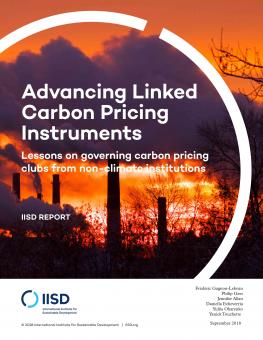
Advancing Linked Carbon Pricing Instruments: Lessons on governing carbon pricing clubs from non-climate institutions
The implementation of the Paris Agreement is anchored in a wide variety of climate targets and domestic policies, captured in Parties’ Nationally Determined Contributions (NDCs) and intended to help countries meet the goals of the agreement. Economic instruments—and more specifically carbon pricing instruments (CPIs)—are increasingly considered as a key policy tool to reduce greenhouse gas (GHG) emissions.
In this report, IISD analyzes the possible development of innovative approaches to linking CPIs. If jurisdictions around the world are interested in enhancing cohesion between various CPIs, what kind of institution(s) might be designed—beyond or building on existing linked instruments like the Western Climate Initiative (WCI) and the Regional Greenhouse Gas Initiative (RGGI)—to aid their efforts? What cooperative arrangements would be best suited to develop common or reciprocal standards to ensure environmental integrity and robust accounting, share market infrastructure and allow members to share experiences? What governance models could help develop and oversee these types of cooperation?
This paper considers how carbon pricing club members could govern their interactions to ensure emissions reductions and raise their mitigation ambitions while keeping transaction costs low. However, unlike many studies conducted to date, we draw on examples from institutions that are not focused on carbon markets or climate change, the Organisation for Economic Co-operation and Development (OECD), the Asia-Pacific Economic Cooperation (APEC), the International Fuel Tax Agreement (IFTA) and the Missile Technology Control Regime (MTCR).
You might also be interested in
December 2024 | Carbon Minefields Oil and Gas Exploration Monitor
In November 2024, 23 oil and gas exploration licences were awarded across five countries, with Russia granting the licences that account for the largest portion of embodied emissions.
Increased Support Needed to Achieve India's Clean Energy Goals
India is on track to achieve many of its 2030 clean energy goals but needs to step up government support measures to accelerate the deployment of offshore wind, electric vehicles, and green hydrogen, according to a new report.
Budgeting for Net Zero
This study estimates the cost gap for battery energy storage systems (BESSs), offshore wind, solar photovoltaic (PV), electric vehicles (EVs), and green hydrogen (GH2) to inform government support.
Artisanal and Small-Scale Mining of Critical Minerals
This report examines the potential for artisanal and small-scale mining (ASM) to take an expanded role in the global supply of critical minerals.